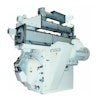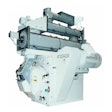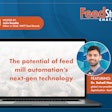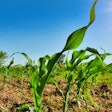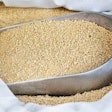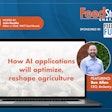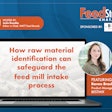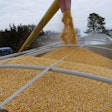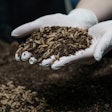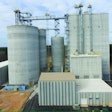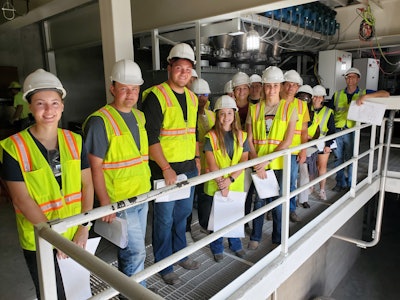
Internships are a cornerstone of many secondary education degree programs. Among their many benefits, internships can provide real-world, degree-specific experiences that can’t be taught in a classroom. However, not all internships are created equal. While valuable internships entrust interns with meaningful assignments and clear guidelines, it is not uncommon for interns to find themselves doing busy work or not given enough responsibilities to make the job worthwhile.
Another pathway for students to learn the skills needed for their future jobs is a traineeship. A traineeship focuses more on developing general employability skills, enabling trainees to pursue a wide range of jobs afterward.
With a new traineeship program being offered at Iowa State University, the feed industry’s future workforce will soon be able to take advantage of this unique opportunity at the Iowa State University (ISU) Kent Feed Mill and Grain Science Complex.
New complex provides state-of-the-art training ground
When Dr. Dirk E. Maier, professor and director of Iowa State University’s Kent Feed Mill & Grain Science Complex, started at ISU in 2015, he was charged with improving and innovating the traditional way of providing feed education to students not only in the Department of Agricultural and Biosystems Engineering, but across ISU’s College of Agriculture and Life Sciences. The university’s ultimate goal was to attract more people to jobs in the feed industry.
“There was a report that the U.S. feed industry was facing a major shortage of qualified technical talent, and we weren’t only talking about operations managers of the manufacturing facilities,” Maier said. “We were talking about technologists, engineers and scientists that support or work for feed companies, as well as engineering firms.”
To replenish the feed industry’s talent pipeline, Maier, along with other visionaries at ISU, envisioned a multi-disciplinary agri-industrial facility that would provide students with ongoing, hands-on experience manufacturing feed on a commercial scale, along with a supporting feed technology minor, allowing students to earn credits while gaining skills they can apply as future employees.
The concept came to fruition in September 2023 with the opening of ISU’s Kent Feed Mill and Grain Science Complex, featuring a 100-foot concrete mill tower, 40-foot concrete pelleting plant, 200,000 bushels of grain storage with handling and drying equipment, analytical laboratory, ingredient warehouse, state-of-the-art automation and controls, a pilot plant, and an educational building with a 50-person classroom.
The facility serves several missions: to enhance teaching programs in feed technology, animal nutrition, and grain operations and quality, to provide extension and industry outreach programming, to support research, and to manufacture diets for ISU livestock and poultry research farms and external clients.
In addition to teaching classes on-site, the complex contracts with local farm partners to guarantee a substantial amount of feed tonnage orders to manufacture feed on a commercial scale.
Opening the facility was a foundational step toward creating ISU’s Feed Technology and Mill Management Traineeship Program.
New minor broadens feed mill access to students
Equally important as the physical training ground, a new feed technology minor was introduced at ISU to attract a broader base to the feed industry and related fields. The feed technology minor can be added to any ISU major, but is targeted at engineering, technology, animal science, nutritional sciences and business majors.
“Those majors are what the industry needs,” Maier said. “A minor isn't going to make a specialist in feed processing and feed manufacturing, but a minor can enlighten students on career path opportunities that they may not have known about as agriculture engineering, industrial technology or agribusiness majors.”
Courses offered in the feed technology minor and taught at the facility include grain processing and handling, feed processing and technology, and food processing for companion animals, as well as practicals — three-credit labs — like preservation of grain quality and feed safety, ingredient quality and analytics.
The feed technology minor opens doors for students interested in gaining hands-on experience working in feed manufacturing as they pursue their degrees.
Traineeship program extends education opportunities
Staffing the agri-industrial facility with student-employees is a core element of ISU’s Feed Technology and Mill Management Traineeship Program.
“If I hired the number of students needed to operate the facility, it would only be two,” Maier said. “But if we want to hire more students, we need to pay them, and so we came up with a traineeship program in order for students who are interested, beyond those in the feed tech minor, to work there.”
Any student can apply to work at the feed mill, but to be accepted as a trainee in the program, students must have completed a minimum of one semester or summer at ISU’s feed mill or a commercial feed mill and commit to at least 10 hours per week of work.
Acceptance into the program as a freshman allows students to work at the facility for up to four years, where they’ll receive training in production, safety, maintenance, sanitation, engineering, quality control, purchasing, ration quotations, inventory management, budgeting, regulatory compliance, leadership and supervision.
The complex’s operations are organized into five departments that staff and faculty oversee: purchasing, production, quality control, maintenance/sanitation and engineering. Students who participate in the program for four years get to experience each department and progress through various roles and responsibility levels, starting with production and department trainee (first year), followed by production and department shift lead (second year), production or department shift supervisor (third year), and finally assistant production or department manager (fourth year). With each new role, the minimum requirement for semesters involved in the program increases.
“You can't get all that experience in one summer internship,” Maier said. “There's a lot of great internship programs out there, but this traineeship program is a longer-term investment for students.”
The program is funded through The ISU Foundation with the help of industry sponsors. The ISU Foundation is establishing a traineeship fund to pay for trainees’ hourly wages, and each US$5,000 sponsorship supports one student’s wages for one semester.
As opposed to a scholarship, there are no minimum grade point average requirements for the traineeship program. However, students must be considered academically qualified as determined by the administrative authority. This highlights the program’s emphasis on cultivating any student’s interest in feed manufacturing, regardless of their academic abilities.
“I’ve had a lot of great students working in the industry that graduated with below a 3-point GPA, and I couldn’t get scholarships for them.” Maier said. “Here, I can hire them because we want students that are interested in working to develop their skills.”
Maier said the program is on track to accept its first class of trainees in the spring 2024 semester. Those who continue the program from their freshman through senior years will graduate as early as December 2027, equipped with the feed manufacturing experience needed to lead the industry’s future workforce.

